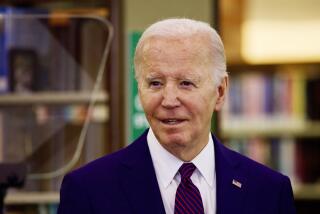Stem Cell Debate Is Getting Personal
- Share via
The phone line crackled. “I’m so upset at this Wall Street Journal editorial,” Jim Warsaw said. “Did you see the Journal today? You got me on an anger day. I’m so uptight about this.”
I met Warsaw 18 months ago and although we’ve hooked up only once for lunch, he’s a guy I really like. He has Parkinson’s disease, and I admired him from the moment one of his friends at the Balboa Bay Club said to him as they passed in a hallway, “Hey, Jim, you’re kind of tilting to the right today.”
The gentle jest told me that Warsaw had cultivated a comfort level in which humor about the sometimes debilitating nature of his ailment was acceptable. It spoke volumes about the spirit he’d brought to fighting the disease, first diagnosed in 1993.
Until Thursday, I’d never heard the kind of frustration that leaped out of him when talking about the fight of his life. The Journal editorial had raised cautionary flags -- scientific, political and philosophical -- about unleashing stem cell research.
Coincidentally, I’d phoned Warsaw to talk about Proposition 71, the $3-billion bond measure on the November ballot that would do just that. Parkinson’s is one of various diseases, including diabetes and Alzheimer’s, for which advocates say expanded stem cell research could be a godsend.
Stem cells are gathered from embryos and can grow into specific types of cells that, in theory, can be used to fight disease. The science is often overshadowed in debates by morality, what some say is the destruction of the embryos, the foundation of human life, in the course of retrieving the cells. Three years ago, President Bush approved use of federal funds for harvested stem cells but not for new ones -- a decision that angered Warsaw.
Proposition 71 backers say hundreds of thousands of embryos -- no longer needed by the couples -- are available in fertility clinics around the country. Those embryos should be used for medical research, they argue.
When we first met in early 2003, Warsaw told me how he hoped to bring the same determination and focus to his Parkinson’s that he’d brought to the sports headwear business that made him rich.
But Warsaw has found that it’s heavy sledding in the disease-fighting business.
“I respect the religious issues” of stem cell research, he says. “I really do. I think it’s an important thing.” But when it comes to stem cell research, he says, “millions of people are not getting help because of -- quote unquote -- religious issues. It has nothing to do with religious issues.”
He belittles President Bush’s decision to spent $25 million on stem cell research, which the White House has touted to indicate the president’s interest. “You know what $25 million will buy?” Warsaw asks. “Nothing.”
Proposition 71 backers say the public supports expanded stem cell research. Warsaw knows that but is wary. “I don’t think it’ll be as easy as people think [to pass],” he says. “I don’t think people understand these are discarded embryos that are not going to be used.”
Warsaw concedes the uncertainties about whether stem cells will produce cures but says that’s the nature of medical research. Joan Samuelson, a executive committee member of the Proposition 71 campaign from Northern California, says, “It’s so clear that stem cells would help.”
Californians soon will start boning up on Proposition 71. They may come at it from different angles, but I sense that voices like Warsaw’s will dominate the debate.
“If this isn’t done this time around and we get thwarted again,” he says, “what’s the hope? It’s not a religious thing. I respect everyone’s faith, but this is for humanity. If they think we’re killing people, I say, ‘You’re killing me.’ ”
Dana Parsons’ column appears Wednesdays, Fridays and Sundays. He can be reached at (714) 966-7821 or at dana.parsons@latimes.com. An archive of his recent columns is at www.latimes.com/parsons.






